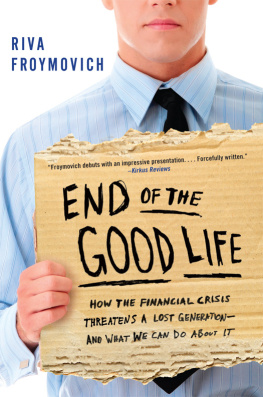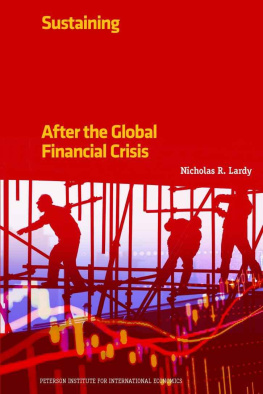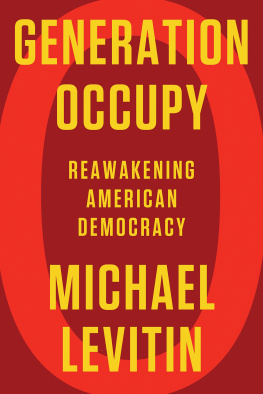
For my parents: Thank you.
And in honor of your parents, and the parents before that.
For our future, together, Lee.
CONTENTS
He had come a long way to this blue lawn, and his dream must have seemed so close that he could hardly fail to grasp it. He did not know that it was already behind him, somewhere back in that vast obscurity beyond the city, where the dark fields of the republic rolled on under the night.
F. Scott Fitzgerald, The Great Gatsby
It will sound to you like some dystopian universe, but everyone should have seen this coming. Indeed, many leaders have just ignored it.
From tax changes to national spending priorities to labor laws, economic policies progressively implemented since my parents settled in America in the 1980s have systematically cut off opportunities for young adults to move up the economic ladder. But the financial crisis that started in 2007 and plummeted the country into the Great Recession has made that goal even harder to reach. The economic turmoil has become the biggest threat to individual prosperity and the global economy since the Great Depression in the 1930s. It has exposed vulnerabilities in the economy long ignored, and magnified them, creating extraordinary hurdles for this nations future.
As a result, Generation Y, roughly defined as those born between 1976 and 2000, can expect lower wages and less job security as they compete with peers in faster-growing economies such as Chinas and Brazils. They can expect a higher cost of living as the prices of energy and food remain near the highest levels in history. These young workers will have to get by with fewer benefits, including health care and pensions, since most governments in the developed world are severely in debt. In fact, as they struggle to rebalance bloated budgets, leaders will probably deem much federal social support unsustainable and will also allow companies to reduce benefits for the sake of desperately needed profits. Generation Y will likely have to pay higher taxes to make up for the large government debts and to support an unprecedented aging of the population in the richest countries in the world. So far, thats less pay and job security, and less federal support despite those higher taxes. But many will feel lucky to have a job at all. Unemployment is expected to remain relatively high well into the future after thousands of jobs were wiped away by the financial crisis. Their return would require large amounts of federal stimulusmoney that the government has so far been unwilling to commit, given the nations high debt. As a result, many in Generation Y will accept jobs for which they are significantly overqualified, wasting a top-notch education they went into personal debt for, as well as the skills they acquired along the way in unpaid internships. Generation Y will also find it more difficult to take out a mortgage to buy a home, given tougher loan rules. But many wont be able to afford to buy a home anyway. Stock markets will be too volatile for ordinary people to earn a supplementary income through investingand hedge funds that the little guy just cant compete with will continue to dominate the market. Many young people are already scarred by the financial market instability seen during the crisis, and upset that scandals such as Bernard Madoffs massive Ponzi scheme have led to only limited financial regulatory reforms. All this will leave the Millennial generation with fewer opportunities to save money for its future and higher hurdles for starting a family and transitioning into independence.
This is what we have to look forward to if no real change occurs. An entire generation raisedperhaps with a sense of self-entitlementto optimistically chase its dreams, believe in the power of hard work, and be confident in Americas economic progress, led by examples such as my parents, will have to face a much harsher reality than they ever imagined and find a new way to a stable life. And the phenomenon is not contained to the United States. The impact on Generation Y will be felt across the most developed, industrialized, and advantaged countries in the world.
This marks the End of The Good Life, the end of a certain set of expectationspromised by our parents and governments for decadesfor how we should live, what we should value, and what we can achieve. The financial crisis exacerbated accumulating problems in the global economy and revealed the illusion. Its most disappointing and enduring upshot will be the loss of one of modern societys greatest values: the globalized American dream of doing better than the generation before. Instead, Generation Y could be stuck in limbo, never quite becoming the people they hoped to be, and missing out on a fair chance at economic and social mobility. Americas most important asset, the skills and economic contributions of its people, will be subverted.
Snapshot of Generation Y and America Today
Millennials are entering adulthood at a period of historically high joblessness, with youth unemployment at nearly record highs and exceeding the rate in the broader population at least two times over. The Great Recession of 2008 and 2009 in the United States saw the largest increase in the youth unemployment rate since government began collecting data in 1948and it could take another decade before all the lost jobs are recovered. Those arrears grow each month someone is out of a job; each month someone is out of a job, the more likely that person will stay out of a job for another month. The cycle is difficult to escape.
As a result, many members of Generation Y are living with parents or other relatives long after they should have moved out, working in unpaid or low-paid jobs just to keep resumes filled with something, agonizing over whether they can afford to have children, and struggling to secure a small-business loan with a reasonable interest rate.
Generation Y in the United States isnt facing a crisis alone. In Spain, half of all young people are out of work. In the United Kingdom, one out of every five young people has no job. Lower or even negative economic growth in several European economies after the crisis will make it that much harder for job numbers and wages to recover, sidelining a generation of young people there. A study by the Office for National Statistics in the United Kingdom confirmed these fears. It showed that college graduates today are having a much tougher time finding work than college graduates in the early 1990s. And those who are charmed enough to find a job are working well below their potential. More than one in every three recent diploma recipients work in a low-skilled job, compared with about one out of every four in 2001. Those low-skilled jobs, which came after three years of university, include postal workers, hotel porters, cleaners, and catering assistants.
Of course, Generation Y is fortunate in many ways compared to generations that came before. But it seems as though all those advantages are going to waste. We are the most educated group of 20-somethings in history, living in the twenty-first century, and we just cant afford to grow up. Now that Im 28 years old, just like my mother when she moved across the Atlantic Ocean, I fear with good reason that I wont be able to provide as much for my childrenor for myselfas my parents did for me. Sadly, this fear is apparent in many of my peers as well.
Already, the anger is boiling over in demonstrations around the globe, as the immediate effects of the crisis start to hint at whats to come, because underemployment and low pay at a young age have knock-on effects on the rest of a persons working life.
Next page






